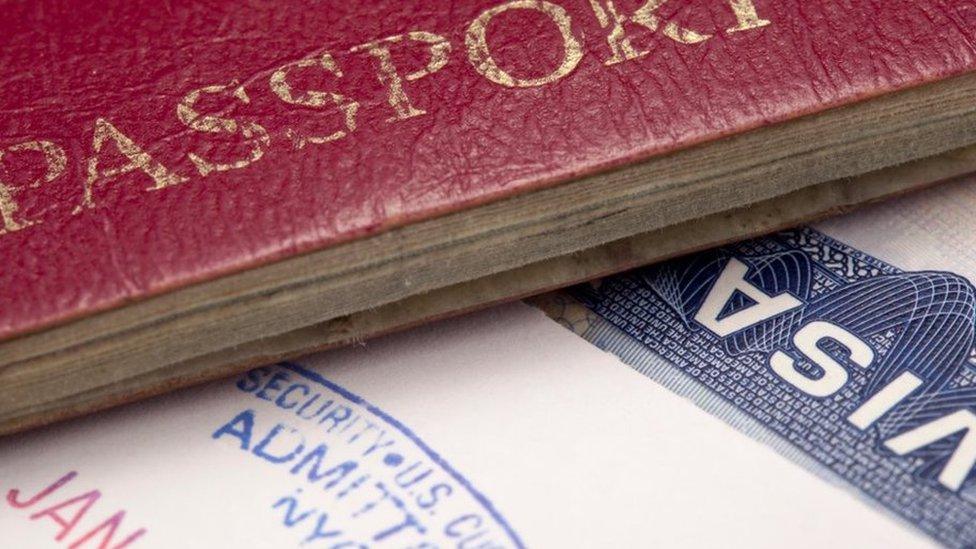Brexit and music: How leaving the EU could change gigs for artists and fans
- Published

Ed Sheeran, Adele, Stormzy: British artists who have followed a well-trodden path of festival slots and small gigs around Europe on their way to becoming some of the UK's biggest names in music.
But what if acts looking to follow in their footsteps, and those from the EU hoping to make it in the UK, had to deal with extra costs and the "royal pain" of stricter border controls?
The government's told Newsbeat it's "committed to protecting" the British music scene when Brexit happens.
Meanwhile people in the music industry say they're looking to "take advantage" of the situation as the UK gets ready to leave the European Union.
So how could Brexit affect the music industry for artists, people working behind the scenes - and for you, the fans?
Newsbeat's been finding out about the potential opportunities and problems from those in the know.
The British up-and-comers

Singer-songwriter Ady Suleiman released his debut album earlier this year and wants to capitalise on having new listeners around Europe
Singer-songwriter Ady Suleiman has just supported Anne-Marie on her European tour.
He says streaming gives him an instant connection to potential audiences around the world - and currently it's easy for him to tour in Europe.
Ady doesn't want to lose that advantage.
"As soon as my music's released in the UK, it's available everywhere because of streaming," he says.
"So if anything it can be more important to play in those countries (in Europe) because you could have a bigger audience there than the UK.
"For example when we were in Poland, my manager said a remix of one of my tracks was the number one Shazamed song there.
"I put it in the set... that was the most interaction I got with fans and then the most we took on the merch stand."
Allow YouTube content?
This article contains content provided by Google YouTube. We ask for your permission before anything is loaded, as they may be using cookies and other technologies. You may want to read Google’s cookie policy, external and privacy policy, external before accepting. To view this content choose ‘accept and continue’.
"We just did 14 different dates in 14 different cities. It's been so easy to get to the shows, we get in the van and drive.
"But if that became more expensive and you had to get things like visas I'd start making quite a big loss."

Chris Jones (left) with guitarist Ed Black and Ady Suleiman on tour in the Swiss alps
"More than that, you've got a situation with the pound not being worth as much as it used to be, so if you make a loss it hurts more.
Ady's tour manager, Chris Jones, says potential changes to touring are "quite a large concern".
"If we needed visas and a carnet (see below) then we have to declare everything we're taking when we leave the UK and then possibly every time we change country around Europe.
"It would slow everyone down, there's also a large cost that can be involved in that."

"It makes me wonder, especially with the smaller acts, how they'd fund those things if they happen."
"If they're not getting out the country, we might not produce the quality of music that we've been producing for decades, it could be a real problem."

The BPI, which says UK labels made £839m in 2017, says emerging acts need support to continue Britain's international musical success
Three of the five top-selling albums in the world in 2017 were released by UK acts. That's according to IFPI, external, which monitors music consumption around the world.
British musicians earned £365m around the world in 2016, up 11% on the previous year - that's according to the British Phonographic Industry (the BPI), which represents UK record labels.
"We want to make sure that our artists continue to travel all around the world - particularly Europe," says Gennaro Castaldo from the BPI.
"Promotion in other places is how it [success] happens."
"I think the government understands that and hopefully that means they'll put music at the forefront of their discussions."

Newsbeat asked the government about these concerns. A spokesperson says it's "committed to safeguarding the growth of this vital and vibrant sector".
Michael Dugher is the boss of UK Music - the group which advises the government on the music industry.
He says there could be a "practical solution" to the potential challenges of touring Europe.
"I think it can be fixed by something like a touring passport," he says.
"[It's] basically a visa arrangement... whereby you're able to tour at relatively short notice and not be restricted in terms of the number of countries you can go to.
"The government doesn't have to wait until we come out of the EU to get that right, we can be doing that straight away."
The European acts heading to the UK

Some of these issues could also affect foreign musicians trying to make a name for themselves in the UK.
Pavvla, a singer-songwriter from Barcelona who has played shows all over Europe, says: "Spotify UK put my songs in loads of playlists so I played a few London shows this Christmas."
"The next few times we go there [the UK] it will be for a small crowd.
"At least for Spain, the British industry is something people really look up to, it's a massive influence. I still want to give it a go."
Allow YouTube content?
This article contains content provided by Google YouTube. We ask for your permission before anything is loaded, as they may be using cookies and other technologies. You may want to read Google’s cookie policy, external and privacy policy, external before accepting. To view this content choose ‘accept and continue’.
Live Europe works with 14 venues around the EU with the aim of helping emerging talent reach new audiences.
Its co-ordinator, Fabian Mcalire, says he's looking for potential opportunities offered by Brexit.
"The discussion isn't really 'How will the UK exit the EU properly?'," he says.
"It's: 'How do we take advantage?'."
Live Europe is part of the European Union's Creative Europe programme.
"[Brexit is] a wake-up call," adds Fabian.
"A lot of people in the music sector were against Brexit and they really want to continue working with the networks they have established in Europe."

Village Underground calls itself 'a springboard' for British acts like The Big Moon before playing shows around Europe
The UK's member of Live Europe is Village Underground in London.
Its director Auro Foxcroft admits there is "a worry" about the impact of Brexit but says "the will is there" to carry on working with European contacts.
"The relationships are all still really strong."
"We all [the Live Europe members] travel around Europe, go to each others' venues and book acts in their clubs.
"It all comes down to money... but I think where there's a will there's a way."
Going to festivals abroad

Music industry insiders say established festival headliners like Arctic Monkeys could feel less impact from Brexit because of financial backing from their record labels
British music fans heading to festivals around Europe shouldn't be too concerned about a sudden lack of British names on the bill.
Primavera's co-organiser Alfonso Lanza adds: "It was a concern when the Brexit result came in.
"But we're in touch with the UK on a nearly daily basis. I don't know how it will raise the prices of production just yet.
"Even if that happens we'll go over it though. We can't do this festival without UK bands and fans."

Primavera organisers say British acts - like 2017 headliners The XX - are important to the future of the festival
Chris Jones adds: "I think the more established acts will be able to financially deal with this [the cost of touring in Europe] without too much trouble.
"It's the smaller acts who will have to think twice".
This article was first published in May 2018, it has since been updated to reflect delays in the UK's departure from the European Union.
Follow Newsbeat on Instagram, external, Facebook, external and Twitter, external.
Listen to Newsbeat live at 12:45 and 17:45 every weekday on BBC Radio 1 and 1Xtra - if you miss us you can listen back here.
- Published7 September 2017

- Published18 May 2013

- Published24 April 2018

- Published24 April 2018

- Published2 March 2018
